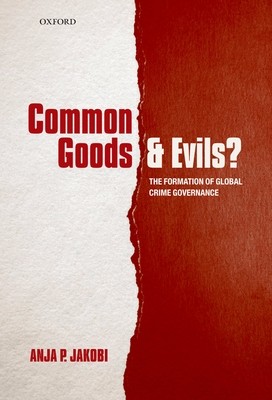
- We will send in 10–14 business days.
- Author: Anja P Jakobi
- Publisher: Oxford University Press, USA
- ISBN-10: 0199674604
- ISBN-13: 9780199674602
- Format: 16 x 23.6 x 2.8 cm, kieti viršeliai
- Language: English
- SAVE -10% with code: EXTRA
Reviews
Description
Global crime governance has emerged as an important component of world politics. It is manifested in national and international agendas, the proliferation of global regulations, growing international budgets, and the enlarged mandates of international organizations. As a result, the definition and prosecution of crime is now increasingly homogenous, but it also shows variance: some crime policies are institutionalized coherently or attached to strong international organizations, while others are weak or dispersed across different forums. Based on sociological institutionalism, this book examines questions of structural variance in the institutional design of global governance. It shows that the interplay of strong actors and rationalization principles lead to more coherent forms of global crime governance, while normative arguments related to crime are more likely to result in fragmented forms. In consequence -- and contrary to many scholars' assumptions -- global crime
governance is strongest in those areas that are least attached to moral statements.
EXTRA 10 % discount with code: EXTRA
The promotion ends in 21d.16:28:35
The discount code is valid when purchasing from 10 €. Discounts do not stack.
- Author: Anja P Jakobi
- Publisher: Oxford University Press, USA
- ISBN-10: 0199674604
- ISBN-13: 9780199674602
- Format: 16 x 23.6 x 2.8 cm, kieti viršeliai
- Language: English English
Global crime governance has emerged as an important component of world politics. It is manifested in national and international agendas, the proliferation of global regulations, growing international budgets, and the enlarged mandates of international organizations. As a result, the definition and prosecution of crime is now increasingly homogenous, but it also shows variance: some crime policies are institutionalized coherently or attached to strong international organizations, while others are weak or dispersed across different forums. Based on sociological institutionalism, this book examines questions of structural variance in the institutional design of global governance. It shows that the interplay of strong actors and rationalization principles lead to more coherent forms of global crime governance, while normative arguments related to crime are more likely to result in fragmented forms. In consequence -- and contrary to many scholars' assumptions -- global crime
governance is strongest in those areas that are least attached to moral statements.


Reviews